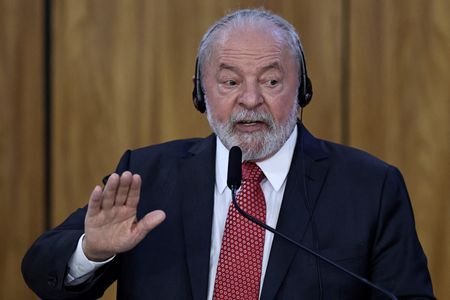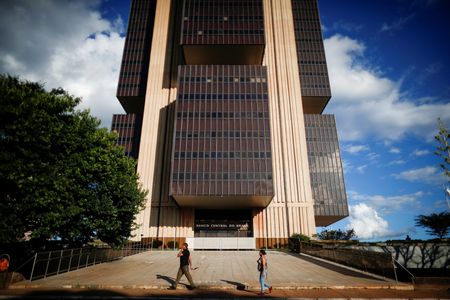By Marcela Ayres
BRASILIA (Reuters) -A new wave of criticism from Brazilian President Luiz Inacio Lula da Silva and his Cabinet against the central bank weighed on financial markets on Friday, which were also reeling from surprisingly strong U.S. employment data.
Lula resumed an offensive against the central bank in a Thursday TV interview in which he suggested a review of the institution’s formal autonomy by the time bank chief Roberto Campos Neto ends his term in December 2024.
Those remarks came a day after the central bank signaled it could hold interest rates at a six-year high for longer than markets expect due to fiscal risks under Lula.
Rafaela Vitoria, chief economist at Banco Inter, said the president’s criticism was spooking investors as it reduced the credibility of monetary policy, which is seen as subject to growing political interference.
“The experience of interference in monetary policy, both from our history and examples from other countries, shows that its effect can be even more negative for inflation, unanchoring expectations and generating more inflationary pressure,” she said.
The dollar rose 1.8% against the Brazilian real, also boosted by surprisingly strong U.S. jobs data. Brazil’s interest rate futures also rose more than 1% in both short and long maturities. Brazil’s benchmark Bovespa stock index was down 0.5%.
Analysts said Lula’s comments were weighing on asset prices, with no truce in sight since the leftist president reiterated that “the interest rate issue” is on the agenda.
Lula also suggested that the country should aim for a “Brazilian standard” for inflation rather than a European one.
Separately, his Science Minister Luciana Santos said at an event with students on Thursday that the central bank must lower interest rates to spur the economy, suggesting the government was looking to mobilize its base behind the agenda.
“And we’re going to have to guarantee that on the streets: lower interest rates to resume the country’s growth,” she said.
“I believe the insistence on this discourse against the central bank and its inflation target could be a meaningful negative inflection point for the country,” wrote Dan Kaya, head of investments at TAG Investimentos, in a note to clients.
The central bank reaffirmed in its Wednesday policy statement “its commitment to set monetary policy to meet the targets” in what was read by many as a message of opposition to eventual changes in the official inflation goals.
Inter economist Vitoria noted that Brazil has the highest real interest rate in the world. Still, she said that is largely due to fiscal concerns after Lula pushed a spending package bypassing a constitutional cap without proposing another budget rule.
Finance Minister Fernando Haddad has unveiled plans to more than halve this year’s estimated budget deficit, which were met with skepticism among private economists. Haddad has also struck a more conciliatory tone with the central bank, although he still complains about the high benchmark interest rate as an “obstacle” to the government’s plans.
(Reporting by Marcela Ayres; Additional reporting by Luana Maria Benedito in Sao Paulo; Editing by Brad Haynes, Alistair Bell and Jonathan Oatis)


